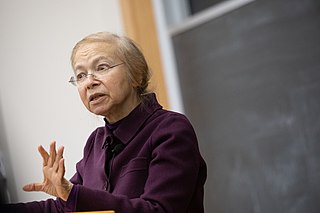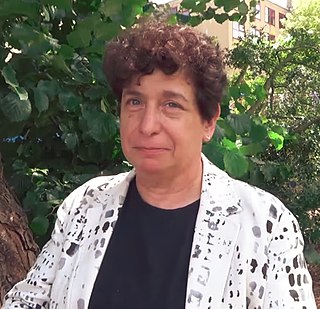Related Research Articles
Ethics is the philosophical study of moral phenomena. Also called moral philosophy, it investigates normative questions about what people ought to do or which behavior is morally right. Its main branches include normative ethics, applied ethics, and metaethics.
Hedonism is a family of philosophical views that prioritize pleasure. Psychological hedonism is the theory that the underlying motivation of all human behavior is to maximize pleasure and avoid pain. As a form of egoism, it suggests that people only help others if they expect a personal benefit. Axiological hedonism is the view that pleasure is the sole source of intrinsic value. It asserts that other things, like knowledge and money, only have value insofar as they produce pleasure and reduce pain. This view divides into quantitative hedonism, which only considers the intensity and duration of pleasures, and qualitative hedonism, which holds that the value of pleasures also depends on their quality. The closely related position of prudential hedonism states that pleasure and pain are the only factors of well-being. Ethical hedonism applies axiological hedonism to morality, arguing that people have a moral obligation to pursue pleasure and avoid pain. Utilitarian versions assert that the goal is to increase overall happiness for everyone, whereas egoistic versions state that each person should only pursue their own pleasure. Outside the academic context, hedonism is a pejorative term for an egoistic lifestyle seeking short-term gratification.
Normative ethics is the study of ethical behaviour and is the branch of philosophical ethics that investigates questions regarding how one ought to act, in a moral sense.

Peter Albert David Singer is an Australian moral philosopher who is Emeritus Ira W. DeCamp Professor of Bioethics at Princeton University. Singer's work specialises in applied ethics, approaching the subject from a secular, utilitarian perspective. He wrote the book Animal Liberation (1975), in which he argues for vegetarianism, and the essay "Famine, Affluence, and Morality", which argues the moral imperative of donating to help the poor around the world. For most of his career, he was a preference utilitarian. He revealed in The Point of View of the Universe (2014), coauthored with Katarzyna de Lazari-Radek, that he had become a hedonistic utilitarian.
In ethical philosophy, utilitarianism is a family of normative ethical theories that prescribe actions that maximize happiness and well-being for the affected individuals. In other words, utilitarian ideas encourage actions that lead to the greatest good for the greatest number. Although different varieties of utilitarianism admit different characterizations, the basic idea behind all of them is, in some sense, to maximize utility, which is often defined in terms of well-being or related concepts. For instance, Jeremy Bentham, the founder of utilitarianism, described utility as the capacity of actions or objects to produce benefits, such as pleasure, happiness, and good, or to prevent harm, such as pain and unhappiness, to those affected.

Virtue ethics is a philosophical approach that treats virtue and character as the primary subjects of ethics, in contrast to other ethical systems that put consequences of voluntary acts, principles or rules of conduct, or obedience to divine authority in the primary role.

Rosalind Hursthouse is a British-born New Zealand moral philosopher noted for her work on virtue ethics. She is one of the leading exponents of contemporary virtue ethics, though she has also written extensively on philosophy of action, history of philosophy, moral psychology, and biomedical ethics. Hursthouse is Professor Emerita of Philosophy at the University of Auckland and Fellow of the Royal Society of New Zealand.
David Schmidtz is a Canadian-American philosopher. He is Presidential Chair of Moral Science at West Virginia University's Chambers College of Business and Economics. He is also editor-in-chief of the journal Social Philosophy & Policy. Previously, he was Kendrick Professor of Philosophy and Eller Chair of Service-Dominant Logic at the University of Arizona. While at Arizona, he founded and served as inaugural head of the Department of Political Economy and Moral Science.

Joseph Raz was an Israeli legal, moral and political philosopher. He was an advocate of legal positivism and is known for his conception of perfectionist liberalism. Raz spent most of his career as a professor of philosophy of law at Balliol College, Oxford, and was latterly a part-time professor of law at Columbia University Law School and a part-time professor at King's College London. He received the Tang Prize in Rule of Law in 2018.
John Broome is a British philosopher and economist. He is emeritus White's Professor of Moral Philosophy at the University of Oxford and emeritus Fellow of Corpus Christi College, Oxford.
Jiyuan Yu was a Chinese moral philosopher noted for his work on virtue ethics. Yu was a long-time and highly admired Professor of Philosophy at the State University of New York at Buffalo, in Buffalo, New York, starting in 1997. Prior to his professorship, Yu completed a three-year post as a research fellow at the University of Oxford, England (1994-1997). He received his education in China at both Shandong University and Renmin University, in Italy at Scuola Normale Superiore di Pisa, and in Canada at the University of Guelph. His primary areas of research and teaching included Ancient Greek Philosophy, and Ancient Chinese Philosophy.

Frances Myrna Kamm is an American philosopher specializing in normative and applied ethics. Kamm is currently the Henry Rutgers University Professor of Philosophy and Distinguished Professor of Philosophy at Rutgers University in New Brunswick, New Jersey. She is also the Littauer Professor of Philosophy and Public Policy Emerita at Harvard University's John F. Kennedy School of Government, as well as Professor Emerita in the Department of Philosophy at New York University.

R. Jay Wallace is Distinguished Professor of Philosophy and William and Trudy Ausfahl Chair at the University of California, Berkeley. His areas of specialization include moral philosophy and philosophy of action. He is most noted for his work on practical reason, moral psychology, and meta-ethics.
David Simon Oderberg is an Australian philosopher of metaphysics and ethics based in Britain since 1987. He is Professor of Philosophy at the University of Reading. He describes himself as a non-consequentialist or a traditionalist in his works. Broadly speaking, Oderberg places himself in opposition to Peter Singer and other utilitarian or consequentialist thinkers. He has published over thirty academic papers and has authored six books: The Metaphysics of Good and Evil, Opting Out: Conscience and Cooperation in a Pluralistic Society, Real Essentialism, Applied Ethics, Moral Theory, and The Metaphysics of Identity over Time. Professor Oderberg is an alumnus of the Universities of Melbourne, where he completed his first degrees, and Oxford where he gained his D.Phil.
Roger Stephen Crisp is fellow and tutor in philosophy at St. Anne's College, Oxford. He holds the university posts of Professor of Moral Philosophy and Uehiro Fellow and Tutor in Philosophy. His work falls principally within the field of ethics, in particular metaethics, normative ethics, and applied ethics. In addition, he is chairman of the Management Committee of the Oxford Uehiro Centre for Practical Ethics.

Pragmatic ethics is a theory of normative philosophical ethics and meta-ethics. Ethical pragmatists such as John Dewey believe that some societies have progressed morally in much the way they have attained progress in science. Scientists can pursue inquiry into the truth of a hypothesis and accept the hypothesis, in the sense that they act as though the hypothesis were true; nonetheless, they think that future generations can advance science, and thus future generations can refine or replace their accepted hypotheses. Similarly, ethical pragmatists think that norms, principles, and moral criteria are likely to be improved as a result of inquiry.
Eva Feder Kittay is an American philosopher. She is Distinguished Professor of Philosophy (Emerita) at Stony Brook University. Her primary interests include feminist philosophy, ethics, social and political theory, metaphor, and the application of these disciplines to disability studies. Kittay has also attempted to bring philosophical concerns into the public spotlight, including leading The Women's Committee of One Hundred in 1995, an organization that opposed the perceived punitive nature of the social welfare reforms taking place in the United States at the time.

Joan Claire Tronto, is professor of political science at the University of Minnesota, and was previously professor of women's studies and political science at Hunter College and the Graduate School, City University of New York.
Richard Kraut is the Emeritus Charles and Emma Morrison Professor in the Humanities at Northwestern University and a specialist in ancient Greek philosophy.
References
- ↑ "Sumner, L. W." Library of Congress. Retrieved 5 March 2015.
[Sumner, Leonard Wayne;] [b. May 18, 1941]
- ↑ University of Toronto, Philosophy Department Archived 2007-03-10 at the Wayback Machine
- ↑ 'Normative Ethics and Metaethics', Princeton University, 1965, 269 pages; available from ProQuest.
- ↑ Complete index of University Professors Archived 2006-05-16 at the Wayback Machine , University of Toronto's website. See also List of University of Toronto people.
- ↑ List of Fellows, Royal Society of Canada's website.
- ↑ "Sumner Wins Molson Prize" (PDF). Philosophy News (Fall 2009). University of Toronto, Department of Philosophy: 1. Retrieved January 13, 2022.
- ↑ New York: Oxford University Press, 1996, ISBN 0-19-824440-1.